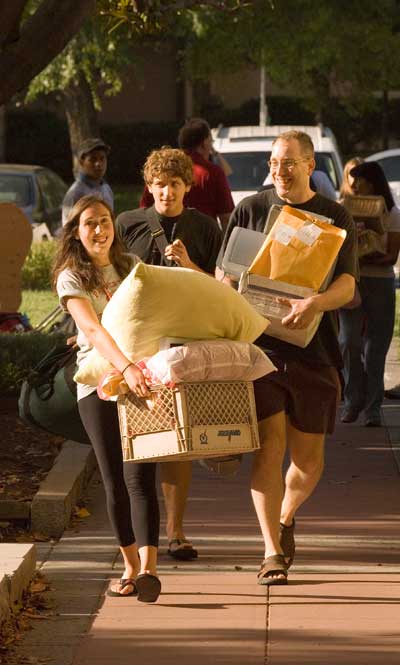Top 8 tips for New Students
1. Set aside time to get settled in
You need time to adjust to your new environment and settle in. Don't get too stressed if you are not able to manage your time and tasks perfectly from the beginning. You will be juggling a number of things other than starting classes and you need time to become comfortable.

2. Don't skip classes
At uni, no one is going to follow you around and make sure that you are going to class. However, you can easily be left behind the rest of the class if you don't attend the lectures and this may ultimately affect your grades. There are courses with mandatory attendance or participation being a large component of your final grade. Therefore it a good idea to attend lecture, even if you are not feeling well.
3. Don't get behind
There is a lot of information that can be put into a semester-long course and it is easy to fall behind fast. Staying on top of your weekly assigned readings, homework, or lab work will affect your study habits. However, go to lecture even if you have not finished all your reading because you will pick up more information than not attending at all.
4. Have a positive attitude
There is no need to be shy, awkward or anxious about attending new classes. You may feel out of place, especially if you are coming from a small high school, but you need to keep up a positive attitude and be confident in your abilities. Keep in mind that you have accomplished a lot up to now to get into the university and you will become more confident over time.
5. Ask for help
A big university campus can be very intimidating because it may not be easy to find your way around it. If you ever have any questions or you are lost, just ask someone for help. Pretty much every student you meet will either be a first year or already have been one and will understand what you are going through and be willing to help.
6. Take advantage of services and resources
Once enrolled in your University or college institution, you gain access to many campus services and resources. If you are having problems or difficulties, there is always a staff around to answer any questions and provide support. It is better to ask for help before you are in too deep because smaller problems can be easily dealt with.
7. Think and Plan ahead
The initial couple of weeks at your university may seem easy, but then there will come a point where many assignments are due in the same week. You should be given a course outline in all of you classes and this will have a list of the due dates of all your assignments.
Take some time off and write down these due dates in a diary, a wall calendar, your mobile phone, or Google Calendar so that you can manage your time more effectively.
8. Have fun and reward yourself
It can be difficult to see how well you are doing in your courses. There may not be many assignments to judge how well you are progressing or you may notice that you grades are lower than usual. Therefore it is important to reward yourself for any achievements you make. Take time off and have fun after completing an assignment, presenting to a class, attending your classes or just keeping a school-life balance.

 Student Life in Australia
Student Life in Australia When it comes to studying abroad in Australia, academics is only half the picture. International students choose Australia not only for the high quality schools, but also for the unique cultural experience. While students prepare for time overseas, they should spend some time thinking about how to ensure the best student life experience possible.
The first major decision that affects student life in Australia is housing. International students in Australia have a variety of housing options, and housing is usually set up through the university or a study abroad program. International students should carefully consider their housing options. On campus housing allows students to have immediate access to student clubs and academic resources, which is not only helpful for studying purposes, but can also help students develop relationships. Even if students choose to live off campus, all international students in Australia should be sure to live close enough to campus to easily partake in classes, activities, and clubs.
International students in Australia, whether on campus or off campus, should also prepare themselves for a roommate. Having a roommate can help international students make connections and venture out, which can be a quintessential step in experiencing student life in Australia. For some tips to have a successful interaction with a roommate, consider the ideas listed Student Life in Australia.
Though housing has a significant impact on student life in Australia, nothing is more important than the student clubs available on campus. All schools and universities, no matter how large or small, will have a number of student organisations. These clubs can range in focus, from simple study groups to specialised activity clubs. In this way, students can join clubs that explore outdoor activities such as surfing, rowing, or cycling. Many schools will have information on clubs during orientation, and most international students will receive details regarding clubs as part of their welcome kit.
Student life in Australia benefits greatly from university activities. These activities will vary from school to school, and can include everything from special guest speakers to group mixers. Students can even participate in group sporting opportunities, either casually or competitively International students can use these activities as a way to not only meet new people, but to experience the culture of the school. Most schools will advertise upcoming events on their websites.
The universities in Australia have much to offer students, but international students in Australia need to remember that some of the best experiences can be found off campus as well. Australia is a thriving, vibrant country, with culturally rich cities and awe-inspiring natural wonders. Therefore, to truly appreciate student life in Australia, international students need to take the time to explore everything this diverse country has to offer.
This pursuit can begin in any of the cities around the country. Australian colleges are located in cities throughout the country, so students have the chance to experience a distinctive slice of the culture no matter where they are. From the sunny southern coast, to the Asian influenced northern side, each area has much to offer. Cities such as Perth, Melbourne, and Sydney have plentiful dining and shopping, reflecting the rich cultural heritage in Australia. Many major cities also have museums and cultural attractions. There are a number of professional sport teams around the country, with notable leagues in rugby, Australian rules football, and more. More information is available at: Shopping in Australia.
Beyond cities, Australia has a plethora of other opportunities for international students. The unique Australian landscape gives international students the chance to experience some of the world's most spectacular natural wonders. In addition to beaches and mountains, there are also notable attractions such as the Great Barrier Reef and the Outback. Students can arrange tours of the Outback or guided trips to the Great Barrier Reef, both of which can offer once in a lifetime experiences. For more details on adventures for international students in Australia, peruse the options in our article Outdoor Activities in Australia.
To help make the transition, all international students can consider more tips here: New Students.
When it comes to getting involved in the student life in Australia, it is important for international students to remember that the only wrong choice they can make is to not get involved.














